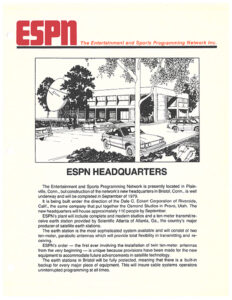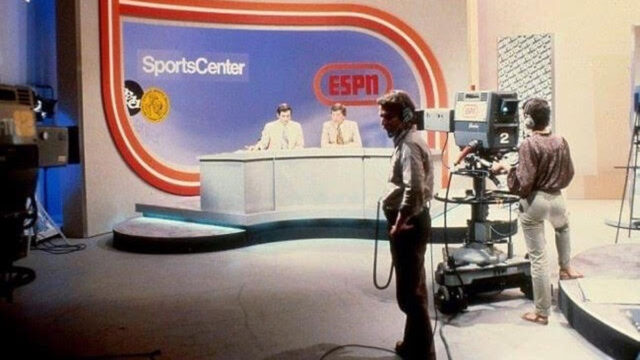Philadelphia, PA (The Hollywood Times — July 4, 2024) — The Early Days of ESPN by Peter Fox is a compilation of stories and visuals depicting the early and intimate details of ESPN’s founding. Sports fans everywhere will adore this recounting of every aspect of what made the biggest sports entertainment network what it is today.
Within the book’s pages, sports lovers will discover the raw, sequential particulars that built up ESPN from a mere idea. The Early Days of ESPN allows fans to experience each unorthodox way that ESPN’s forefathers (and mothers, as readers will come to know) forged their dream into a reality.
Bob Ley, an original ESPN anchor and multiple Emmy Award-winning journalist, spoke on the book’s use of unreported stories.
“I was right there, amid this historic startup, and I still learned things I never knew…This is a compelling account of the people and the moments creating a landmark cultural institution from blueprints and lukewarm coffee,” Ley said. “A story like no other, told in the first person.”
These stories include incredible anecdotes, such as production headquartered in a van parked outside the studio that started in an attic of an office building or the late nights and early mornings spent piecing together highlights of every sport imaginable.
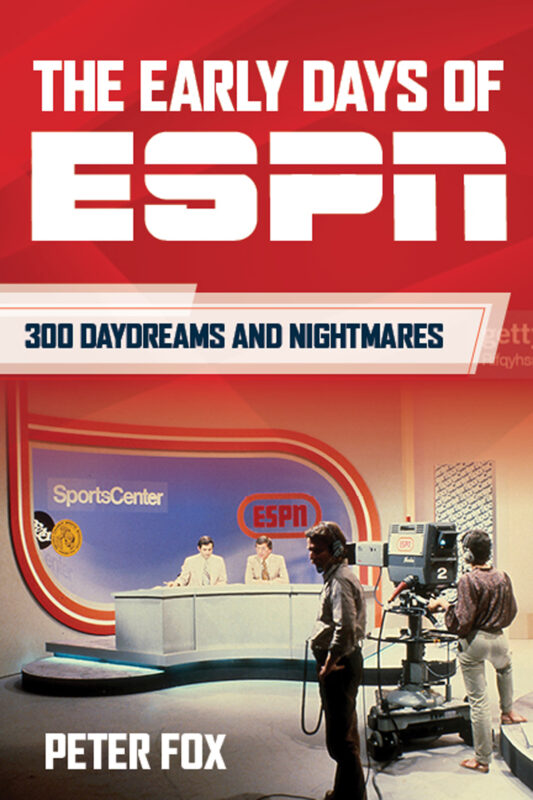
Author Peter Fox weighed into why the book’s publishing was so important. “I wrote this book to shine some light on those people who didn’t get a lot of credit in the birth of the baby so to speak,” said Fox. “They were great people, they were talented people.”
The story lays a strong foundation with each piece of the ESPN puzzle, paying its dues to every single person who made contributions, no matter how small or large.
Fox purposefully wrote the story in this manner, “To give the opportunity to those people who had put their careers on the line,” Fox said.
The book highlights the light bulb of an idea that ESPN was and the notion that the thought of a channel of such nature had value.
“Well I think of it in those terms retrospectively,” said Fox. “When we were in it, it was, that we don’t know what we’re doing but we know in our bellies that if we could deliver sports programming on a regular basis, more than the networks, there has to be an audience…”
Chris “Boomer” Berman, former ESPN anchor and six-time National Sportscaster of the Year, agrees, stating his thoughts on the pioneers that built ESPN.
“We were like Mercury astronauts. We were rebels without a clue and working our asses off,” Berman said. “I knew this was a good idea. We had a hand in building something that grew way beyond our imaginations. When there’s a game on the moon, ‘SPNauts will do it.”
Fox describes himself and others as ‘SPNauts, a nickname that brandishes the originators of the famed sports network. The moniker reflects Fox’s creativity in finding a way to tout himself and his comrades.
The book’s language gives readers an idea of how passionate the founders were about ESPN, described as their “baby,” and how much work the creators put into the project during its “pregnancy.”
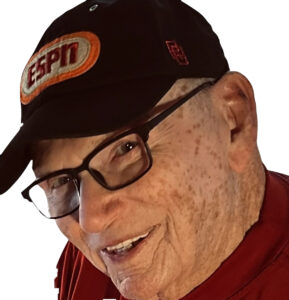
The Early Days of ESPN showcases the relationship between the ‘SPNauts and the sacrifices they made for each other and ESPN.
“They were so passionate,” Fox said. “They did the late night sports centers that would sometimes sign off—you know if a game went long on the west coast—Sportscenter might end up at 3:30, 4:00 in the morning,” Fox described.
“Then they would be back there around 10. So instead of going home they would bring a sleeping bag and sleep under the SportsCentersportscenter desk. I mean, everybody had that kind of dedication. To get the job done and get it up and on.”
Fox contributed to the creation of the book, from his idea to assembling the many characters whose voices were essential to the pages of his design. In the writing process, Fox contacted old friends for interviews. Everyone involved shared a love for ESPN.
“We all pretty much had a common feeling and enthusiasm—certainly in retrospect we did. Some of the people I spoke with I hadn’t talked to in 37, or 38 years and amazingly we would connect online and agree to talk on the phone and when we picked up the phone it would be as if the conversation was an hour ago.”
His career as the founding executive producer of ESPN led to an authentic retelling of stories that would have otherwise gone unheard. The story relays a strong message of dream chasing in the job world—an important idea to push to his readers, in the words of Fox.
“I also see it as a great motivator for passion and vision and teamwork and dedication at the corporate level.”
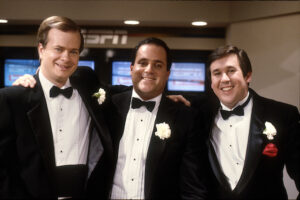
Readers can gather a strong sense of friendship and family from the stories told, and according to Fox, a reason ESPN snowballed into its most significant form. The company’s employees lived together, golfed together, and even played friendly softball games, proudly wearing the prized four-lettered abbreviation on their chests.
Inside the many chapters, readers will find fun facts such as ESPN’s influence in making the once unpopular NCAA tournament, known as March Madness, a hot commodity within the realm of sports.
In the story, Fox details his experience with alcoholism while acting as a catalyst for the birth of ESPN. Fox, who has been sober for over three decades, appreciates the time spent working for and on ESPN.
“You know, as you gather throughout the book, there was a period where it was painful to me—perhaps because of the addiction that was accompanying my flight. But now nearing 37 years sober I have a lot of gratitude for the opportunity that put me in the right place at the right time. So that I was able to enjoy the fruits of being there.”
Fox shared his emotional connection to the book and its overarching story. He mentioned how, in the minds of its creators, ESPN was purely filling a void that sports fans across the country had been longing for. He depicts the strong pride that the ESPN founders hold in their creation.
“Nothing but pride at this point. At that point, we were just feeding the appetite that we knew was there. It has always been veracious that a sports fan will sit down and watch sports until it’s time to do other things like perhaps play sports…we knew that the appetite was there.
“Remember at the time there were three television stations in an urban community…maybe five, so cable television shows up and it’s able to distribute as many signals as we were able to produce. Knowing that we could fill that void, we just fed the sports fan.”
“They were used to getting maybe three hours on Saturday, a couple hours on Sunday…they didn’t get much sports, comparatively, so we filled the gap,” Fox said. “And yes retrospectively it is something that we are all proud of.”
To order the book and learn more go to: https://earlyespn.com/
